Ink Well
Draft cleverly, erase generously, and ink well: Utilize your own writer's blocks and black out three poems to transform hand-drawn environments, reveal coded messages, and advance to the next level -- or freestyle and create your own unique blackout poetry!
A short poetry puzzle game made in 9 days for Godot Wild Jam #69. A walkthrough is available at the end of this page, located right above the downloads/comments.
Credits
- Art & Environments: fantazychai + zoflo
- Writing: t-rex-thriving + fantazychai
- Programming: asterythm + t-rex-thriving
- Sound & Music (Levels 1 & 2): asterythm
- UI/UX Design: zoflo
Note: Ink Well was, in our great and powerful hubris, all but one team member's first-ever foray into any sort of game-making -- design, development, asset creation, etc -- and everyone's first time trying out their respective roles. (Pre-jam learning?! Never heard of her...) We're super proud of what we managed to accomplish learning everything from scratch in just over a week, and hope you like it too!
External Assets
- Fonts used: Tox Typewriter and OpenDyslexic
- Royalty free sound effects & music: Pixabay
- Main theme: "Raining - Ambient Calm Piano Music ( loop )" by Harumachi
- Level 3: "Sci-Fi Ambient Music" by stereocode
- Paper texture: "8 Free Detailed Paper Textures Collection (JPG)" by FreeJect Design
Known Issues Slated For Improvement
- Puzzle difficulty: We're actively looking to improve solvability and decrease the current reliance on walkthroughs, and would appreciate any ideas or suggestions for improving or overhauling the hint system/feedback loop!
- Level 2 hint correction: The first stanza needs to have four words showing, not three. Also, the bottle in the target image should be tipped over, with the message missing.
- Tutorial hint: Add relevant image.
- Sprite animations: Crop frames more precisely for cleaner animations.
- Background music: Make transitions between scenes smoother, and patch out restarting tracks when used in the same scene.
⚠️ Walkthrough - full solutions under cut; proceed with caution! ⚠️
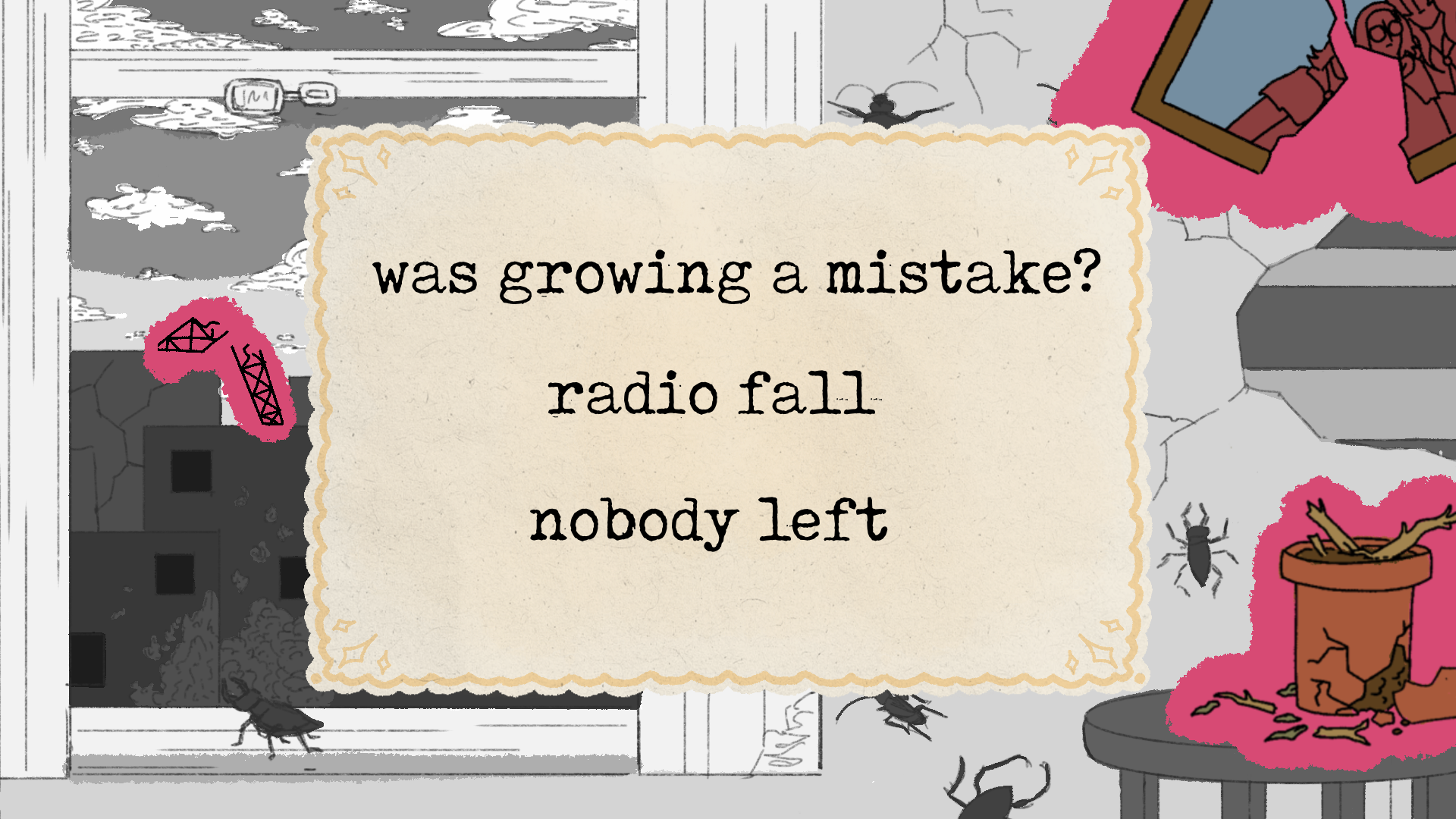
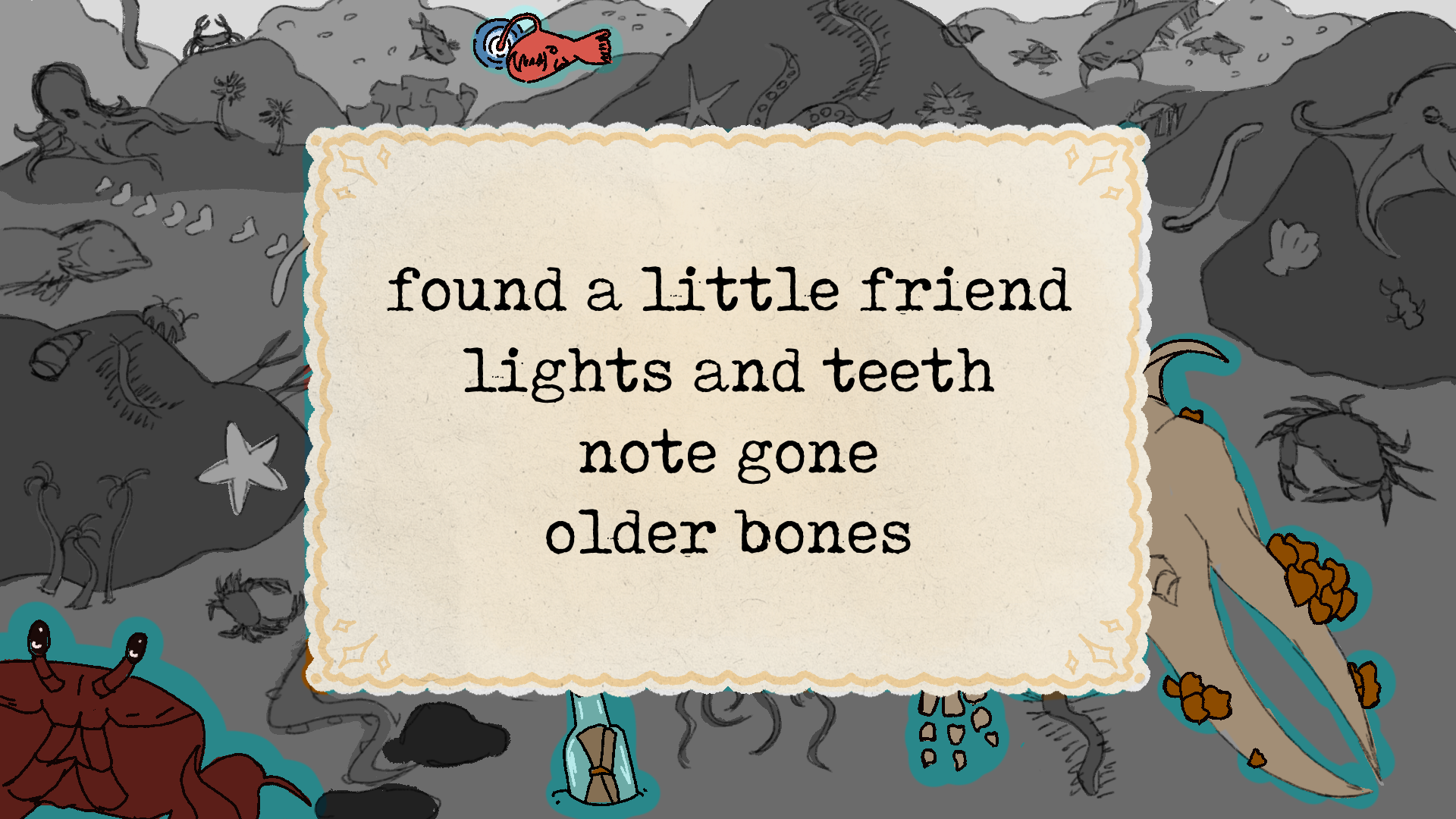
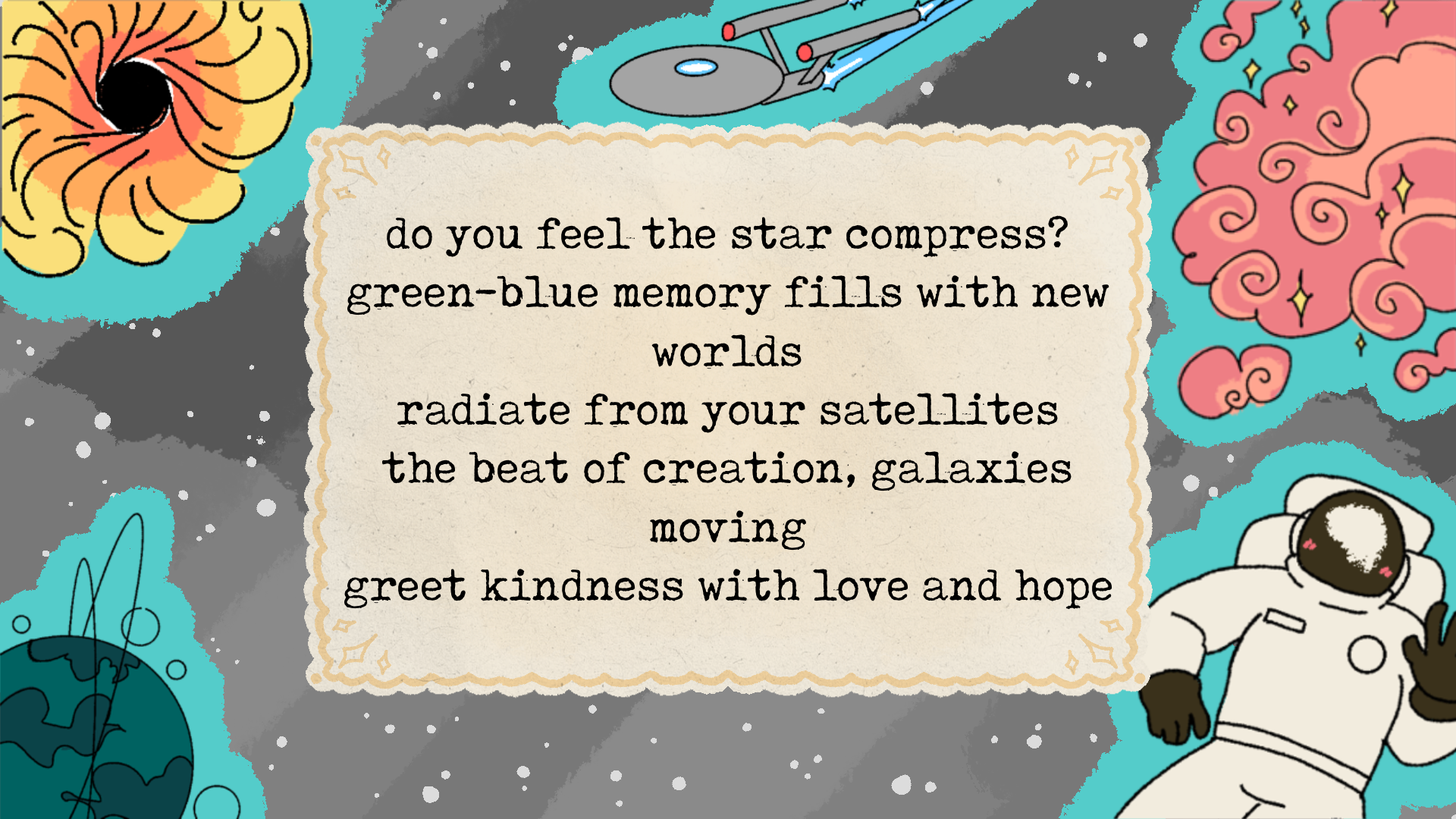
| Status | In development |
| Platforms | HTML5, Windows, macOS, Linux |
| Authors | asterythm, zoflo, fantazychai, t_rex_thriving |
| Genre | Puzzle |
| Made with | Godot, Logic Pro |
| Tags | Atmospheric, Casual, Indie, Minimalist, poetry, Relaxing, Short, Singleplayer |
| Average session | A few minutes |
| Languages | English |
| Inputs | Mouse |
| Accessibility | Interactive tutorial |
Download
Development log
- Fixed builds uploaded; Ink Well is ready to play!May 20, 2024
- Oops!May 20, 2024
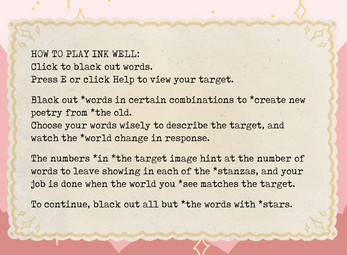
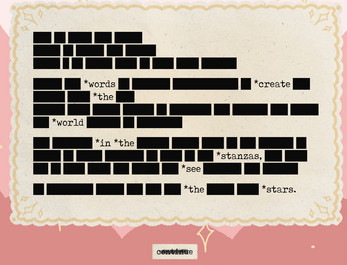
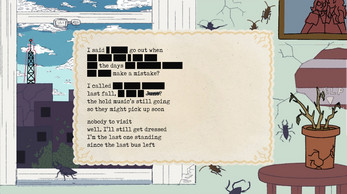
Comments
Log in with itch.io to leave a comment.
OK, I still very much love the concept. I do appreciate that you're looking to improve solvability, too, because I do have to admit it was...well, heavy on the walkthrough.
Part of
the problem-- no, it's not a problem, part of the joy of the game is how poetic it is. But the poetic language does become an issue from a solvability perspective: when the right answer is mostly the feeling of the words, it's very hard to tell whether I'm feeling the same things you are. That turned out to be even more true when one of the intended words was "a" (was it "I found a friend"? something like that?) and I was trying more poetic combinations ("found my little friend"? "I found little friend"?).And the more words there are in the solution, the harder it is to tell which ones I might have right.
So I think the key to improved solvability is feedback. Let the images fade or brighten as the solver gets fewer or more of the intended words correct, because right now there's no distinction between "I have one of the six words wrong" and "I have six of the six words wrong".
I think framing the hint system as a "hint" system is also kind of making your lives harder. Without looking at the hint, you could be trying to achieve anything: making the plant grow, making the station emit music, and so on. So the things you've hidden behind a "help" button are less hints and more basic instructions; I'd stop hiding them.
Anyway, there are a lot of ideas in this game and there are a lot of directions it could go. Good luck with it!
Thank you so much for the detailed feedback! Yeah, to be frank, "walkthrough-heavy" is, well -- it's a very kind way to put it. Though it's wonderful to hear you describe the poetry as a joy (couldn't agree more tbh, I think our writers did a fabulous job), it's just as you say: turns out it's tough to design intuitive, objective solutions for something so inherently subjective!
Per-word feedback was something that got batted around, but the initial sticking point for us was that in a puzzle where all the pieces start off "active" already and you just have to pick the right ones to "deactivate", how do you really offer positive feedback for lack of interaction -- or for that matter, negative feedback on interaction without it being a dead giveaway and taking away the feeling of actually solving something? (As I'm thinking about it again now after the haze of jam time though, I wonder if it couldn't be worth revisiting if we just took things in multi-word buckets instead of per-word, to give you *some* progressive feedback without going word-specific right away? Say, for every X words you correctly black out, you get some positive progressive feedback like the image brightening or otherwise slightly changing, but if any of those X words you blacked out were intended to be part of the solution then you don't get the progression, etc? Which tells you something's wrong, but doesn't tell you right away which ones you went wrong on. Hmm.. definitely worth exploring.)
Anyway, on another note, I think your point about labelling the target image with a Help button/calling it a "hint" system being a misnomer is right on the money -- it's more a necessary question, than an answer. Really good insight there.
Many thanks again for all the excellent suggestions raised here. You rock!!
Aww, thanks! I can't make games to save my life, but boy do I know how to nitpick. I figured it was worth using that skill for good. :-)
So just quickly, in terms of "a puzzle where all the pieces start off active already and you just have to pick the right ones to deactivate": so, yeah, you certainly wouldn't be able to do any kind of "light up when some of the right words are active" (because at the start they all are), or "dim when a correct word is deactivated" (because you'd see it instantly). What I was thinking was that you'd get the feedback specifically when you had the right number of words selected--so for a four-word verse, you wouldn't see any feedback until you'd crossed out all but four of the words. And you couldn't cross out everything and erase things one by one; you'd only get feedback when you were back up to four.
So if the sentence is, I don't know, "My name is Ozymandias, King of Kings: Look on my works, ye Mighty, and despair!" and the target is "King of despair", the feedback would be something like:
Sure, you'll have players who just go "ok, my name is...nothing. ozymandias king of...two. ozymandias king kings...one, so I know 'of' is right and--" but really, anyone who wants to systematically just try every combination is going to do what they're going to do.
Anyway, play around with that. Maybe "one word right" doesn't warrant feedback, so that you can't put in three words, see that you get nothing, and eliminate all three at once. Maybe things only brighten up if it's something like "at least half the words" or "all but one word"--but even those things would be helpful. ("I tried 'name my works' and there's no feedback. I can't rule out all of them, but I do know it's also not 'name my kings' or 'name my despair' or anything else where two of the three words are right"--see, pretty useful!)
Play around with it, see what strikes you. Y'all're probably going to find something you think works well. If this was the result of y'all writing a first game, you've definitely got the instincts to keep going!
Okay, wow, this is super! Thank you so much, definitely using your skill for good here.
This is definitely something we'll have to stick a pin in -- getting feedback at only the correct number of words is something that never even occurred to me, but it makes so much sense now that you've pointed it out. I wonder what else could be done to discourage that sort of systematic brute forcing you describe, as this system does make it significantly easier to reward brute forcing and remove the joy of reading and solving for yourself; maybe the answer does lie in still applying that multi-word-bucket design philosophy, where the sprite lights up only at half, or 2+, or all but one -- which will definitely be handiest for solutions of 3-4 words, which seems to be the sweet spot for puzzles that are tricky but still doable with that sort of hint system -- or maybe there's a greater need to rethink how the puzzles/solving mechanics are designed altogether before we can get into that.
In any case, this is all really promising already! Sending so many thanks, good internet vibes, and invisible baked goods your way. :)
we made a viddy game YAYYY :)
Quick comment for anyone coming from the GWJ submissions page: We're aware that the build currently on itch is, unfortunately, non-functional, and are waiting right now to upload our fixed builds pending approval from the jam organizers! Turns out we missed the .txt files needed for the game to run while exporting... whoops.
Thanks for checking the game page out; we'll post a devlog when the builds are fixed!
Well, you're very committed to the hide-the-text motif, since when I start the game, there's no text at all! (Well, there's a "help" thing off to the side. When I click that, it opens another box with no text at all.)
Also, if you go into "options", there doesn't seem to be a way out of it.
I hope these things are fixable, because the concept looks so interesting!
Haha, you got us. This has all been one big meta-think piece all along...
In all seriousness, yes, the issues are fixable! Already have been, in fact -- we've got our fixed builds exported and ready to go, and are just waiting on permission from the jam organizers to go in and update the files now. We'll post a devlog when we do, and hopefully you can play through and decide for yourself if it lives up to the wait then :)
Thanks for swinging by!
Weather update: We're up and running! Thanks again for your patience, hope you enjoy!